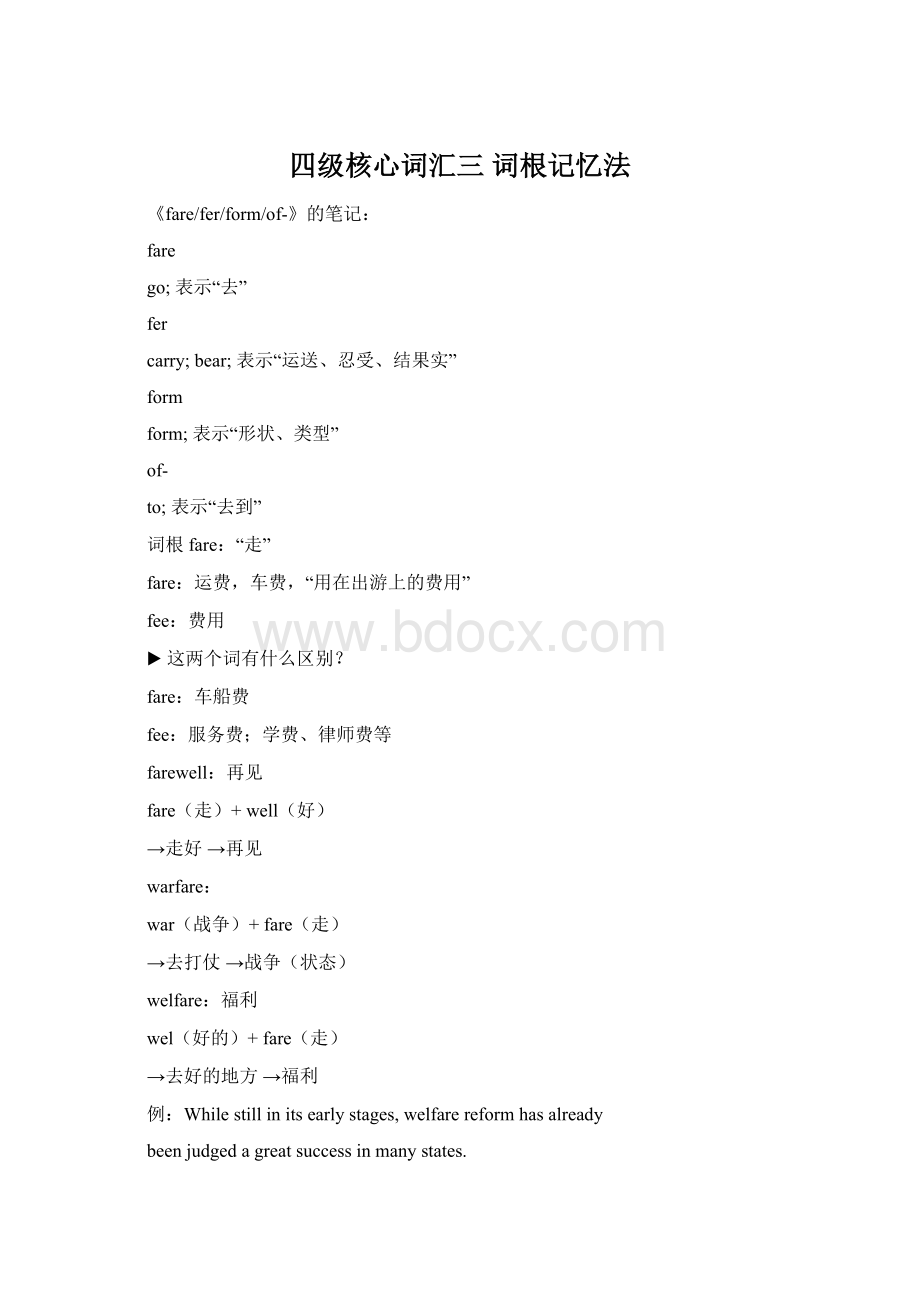四级核心词汇三 词根记忆法.docx
《四级核心词汇三 词根记忆法.docx》由会员分享,可在线阅读,更多相关《四级核心词汇三 词根记忆法.docx(35页珍藏版)》请在冰豆网上搜索。

四级核心词汇三词根记忆法
《fare/fer/form/of-》的笔记:
fare
go;表示“去”
fer
carry;bear;表示“运送、忍受、结果实”
form
form;表示“形状、类型”
of-
to;表示“去到”
词根fare:
“走”
fare:
运费,车费,“用在出游上的费用”
fee:
费用
▶这两个词有什么区别?
fare:
车船费
fee:
服务费;学费、律师费等
farewell:
再见
fare(走)+well(好)
→走好→再见
warfare:
war(战争)+fare(走)
→去打仗→战争(状态)
welfare:
福利
wel(好的)+fare(走)
→去好的地方→福利
例:
Whilestillinitsearlystages,welfarereformhasalready
beenjudgedagreatsuccessinmanystates.
虽然还处于初级阶段,但是福利改革在很多州已被认为是一个
巨大的成功了。
fer:
运载,携带、负担;结果实
ferry:
渡口,“运载东西的地方
conference:
会议
con(一起)+fer(运载)+ence
→带着观点来一起讨论→会议
▶pressconference:
新闻发布会
例:
F&CMotors,amajorautocompany,isholdingapress
conferencenextweek.
大型汽车公司F&C将于下周召开新闻发布会
differ:
=different的动词形式
▶differinsth:
在某方面不同
例:
Onaverage,fathersspokelessthanmothersdid,buttheydid
notdifferinthelengthofutterancesorproportionofquestionsasked.
一般来说,爸爸要比妈妈说的话少,但是从语言的长度和问题的比例
上来看,其实没什么不同。
▶sthdifferfromsth:
相异、不同于
例:
E-commercedoesnotdifferfromwell-known
commercialofferings.
电子商务和广为人知的其他商务形式并没什么不同。
infer:
推断,暗示
in-(内部)+fer(运载)
→把想法带进来,然后得出结果→推断
▶infersthfromsth:
从…中推断出…
Whatcanweinferfromtheconversation?
▶名词形式:
inference
offer:
of(to)+fer(运载)
→带给→提供、给予
例:
WhenshediscussesInternethabitswithherpatients,theyoften
reportthatbeingonlineoffersa"senseofbelongings,andescape,
excitementandfun".
当她和她的患者讨论上网的习惯时,这些患者通常会说上网会带来一种
归属感”“可以让人逃避现实”,“带来兴奋和快乐”。
▶n.:
录取通知,录用信
prefer:
喜爱,偏爱
pre(向前)+fer(运载)
→带到前面→喜爱,偏爱
▶常见用法:
preferto
例:
prefershoppingonlinetoshopping
▶形容词形式:
preferable:
更喜欢的,更合意的
名词形式:
preference:
喜爱,偏爱
favorable:
赞成的
favor(v.&n.):
赞成、赞同、好感
▶infavorof:
支持、赞同
例:
Therewere247votesinfavorofthemotionand152against.
对于这项动议,有247票赞成,152票反对
▶domeafavor:
帮忙
Couldyoupleasedomeafavor?
:
你能帮我一个忙吗?
favorite:
表示“最喜欢的”
refer:
涉及,参考
re(向后)+fer(运载)
→带回、回溯→涉及
→向某个权威寻求意见→参考
▶referto:
涉及
例:
TheenergycrisisinAmericadiscussedheremainlyreferstoa
shortageoffossilfuels.
我们这里所讨论的美国能源危机主要涉及到矿物燃料的短缺。
▶名词形式:
提到,论及,参考
reference:
参考书:
referencebook
教科书:
textbook
suffer:
遭受,忍受
su-(下面)+fer(运载)
sur-→su-
→承受艰难困苦
▶常用搭配:
sufferfrom:
遭受,承受
transfer:
转移、调动、过户
trans-(通过、改变、转移)+fer(运载)
→带着东西通过某地→转移
transact:
trans-(穿过)+act(行为)
→两者之间穿插的运动
→做交易
▶名词形式:
transaction:
交易
▶transact,transport,transfer,transform
transaction
transportthegoods
transfermoneytoyouraccount
transformintoabigcompany
词根fer:
结果实
fertile:
肥沃多产的
可以带来很多果实的
▶注意美音和英音的区别
▶fertilizer:
肥料
例:
Usethefertilizertokeepthelandfertile.
用肥料让土地保持肥沃
词根form:
表示“形状、形式”
form:
形状、形式
formal:
正式的
▶考试常见表达:
formallanguage/conversation:
正规的语言,正规的对话
▶反义词:
informal:
不正规的
formula:
公式
reform:
改革
re-(再次)+form(形状)
→再造一个形状→改革
uniform:
制服
uni-(单一的,一致的)+form(形状)
例:
Primaryamongtheargumentsagainstuniformsis
theirlackofvariety.
关于制服的争论中,最主要的一点是其缺少变化
fare
fare,farewell,warfare,welfare
fer
ferry,conference,differ,infer,inference,offer,
prefer,preferable,preference,refer,reference,
suffer,transfer,fertile,fertilizer
form,formal,informal,formula,reform,uniform
offer
fee,transact,transaction,transform,favorable
《与“动作”相关的词根》的笔记:
cap
take;表示“拿,捉住”
ceive
take;表示“拿”
cept
take;表示“拿”
hab
have;表示“有”
pos
place;put;表示“放”
op-
表示“相反的”
词根cap:
表示“take,hold",“抓住”
capable:
cap(抓住)+-able(可…的)
→能够抓住的→有能力的
▶becapableof:
有能力的
例:
Ateachermustbecapableofinfinitepatience.
老师必须要有无限的忍耐力。
▶名词形式:
capacity
表示“能力”,“容量”的意思
seatingcapacity:
座位量,
一个地方能容纳多少人
例:
Thetheatrehasaseatingcapacityof2000.
这家剧院能够容纳2000人。
capture:
cap(抓住)+-ture
→抓捕,俘虏
例:
Alliedtroopscapturedover300enemysoldiers.
联军抓住了超过300名敌军战士。
▶captive(n.):
俘虏
词根ceive和词根cept:
都是“抓”
accept:
接受
ac-(强调)+cept(抓)
→愿意去拿→接受
▶形容词形式:
acceptable:
可接受的
例:
AllIdidwaslethimknowhisbehaviorwasunacceptable.
我所做的一切就是要让他知道他的行为是不可接受的。
except:
除…之外
ex-(出去)+cept(抓)
→拿出去→除了,除…之外
▶名词形式:
exception:
例外
withoutexception:
毫无例外,一律
例:
AllstudentswithoutexceptionmusttaketheEnglishtest.
所有学生,毫无例外地都要接受这个英语测试
receive:
re-(往回退)+ceive
→拿回来→收到
reception:
招待会,欢迎会
receipt:
收据,发票
热情的接待(hewasreceivedwarmly)
还组织了一个招待会(reception)
为了报销,你还去要了一张收据(receipt)
perceive:
per(完全、一直)+ceive
→完全抓住→理解,觉察
例:
Iperceivedachangeinhisbehavior.
我觉察到了他的行为发生了改变。
词根hab:
表示“拿、拥有”
habit:
习惯
▶短语:
living/study/eatinghabit:
生活/学习/饮食习惯
▶形容词形式:
habitual
prohibit:
禁止
pro(在…之前)+hibit(拿、拥有)
→提前拿住→禁止,不允许
▶用法:
prohibitsbfromdoingsth:
禁止某人做某事
通常指通过法律来禁止
例:
Citizensareprohibitedfromtravelingabroad.
公民被禁止出国旅游。
▶名词形式:
prohibition
一项禁止在公共场所吸烟的法令:
aprohibitionagainstsmokinginpublicareas
▶近义词:
forbid
用法:
forbidsbfromdoingsth.
▶ForbiddenCity:
紫禁城
词根pos:
摆、放
pose(n.&v.):
摆放好位置,姿势、造型
例:
Hewouldn'tanswerthereporter'squestions,nor
wouldheposeforaphotograph.
他既不回答记者的提问,也不会摆造型让大家拍照。
compose:
组成、写作、作曲
com-(一起)+pose(摆放)
→放到一起→组成、作曲、作文
▶常考用法:
becomposedof:
由…组成
例:
Thecommitteewascomposedof10lawyers.
这个委员会是由10个律师组成的
▶名词形式:
composition:
作品、作文
dispose:
dis-(分开,离开)+pose(摆放)
→分开摆放→排列、处理、解决
disposeof:
表示“去掉、除掉”
▶搭配:
例:
It'sdifficulttodisposeofnuclearwaste.
核废料是很难处理的。
▶名词形式:
disposal:
处理
deposit:
de-(向下)+posit(摆放)
→放在下面→沉淀物,存款
例:
Depositcanbemadeinanybank.
任何银行都可以存款。
expose:
暴露、揭露
ex-(出来)+pose(摆放)
→摆出来→使某个东西暴露出来
例:
Thejobexposeshimtoradioactivesmokealldaylong.
这项工作让他整天暴露在放射性烟尘中。
▶名词形式:
exposure
explode:
爆炸
▶名词形式:
explosion:
爆炸,爆发→(数量)激增
例:
Whatisdrivingthiscrimeexplosion.
到底是什么导致了犯罪激增。
explore:
探险、探索
例:
Playisthemostpowerfulwayachildexplorestheworldand
learnsabouthimself.
游戏是一个孩子探索世界,了解自己的最有利的方法。
InternetExplorer
IE浏览器:
exploit:
利用,剥削
例:
Whatisbeingdonetostopemployersfrom
exploitingyoungpeople?
到底如何做才能防止雇主剥削年轻人。
propose:
提议、计划
ro-(向前)+pose(摆放)
→向前提交出一个请求
提议、推荐求婚
例:
Itisproposedthatsomemeasuresshouldbetaken
tosolvethepotentialproblems.
人们建议要找到解决潜在问题的方法。
oppose:
反对
op-(相反的)+pose(摆放)
→站在相反的位置上→反对
▶用法:
beopposedto:
强烈反对
例:
Sheisverymuchopposedtotheidea.
她强烈反对这个意见。
opponent:
表示“对手”
cap
capable,capacity,capture,captive
ceive
receive,perceive
cept
accept,acceptable,except,exception,reception,receipt
hab
habit,habitual,prohibit,prohibition
pos
pose,compose,composition,dispose,disposed,
deposit,expose,exposure,propose,oppose,opponent
op-
oppose,opponent
forbid,explode,explore,exploit,explosion
《tain/cast/ject/draw/tend/ob-》的笔记:
tain
hold;keep;表示“保持、抓住、维持”
cast
throw;表示“投掷”
ject
throw;表示“投掷”
draw
draw;表示“拉”
tend
stretch;表示“拉伸、伸展”
ob-
表示“相反的、附近、朝向”
词根tain:
表示“保持、抓住”
完整含义:
“把手伸出来握住”
contain:
con-(全部)+tain(拿住)
→全部拿住→包含、容纳
例:
Everythingweeatanddrinkcontainssomesalt.
我们吃的和喝的每样东西都含有盐分
container:
beverage/water/foodcontainer
entertain:
娱乐,招待
enter-(inter-的变体,在…中间)+tain(拿住)
→拿着东西来往于各种人之间→娱乐
entertaining:
表示“使人愉悦的,有趣的”
例:
Attractingandfeedingwildbirdsareentertainingactivitiesthat
havelongbeenenjoyedbypeopleallovertheworld.
吸引和喂养野生鸟类长期以来是全世界人都很喜欢的有趣的活动。
▶名词形式:
entertainment:
sustain:
保持,供养,支持
sus-(在…下面)+tain(拿住)
→在下面支撑→支持、供养
例:
Fewplanetscansustainlife.
没有几个星球可以供人类生存。
▶形容词形式:
sustainable
sustainableeconomicdevelopment:
经济的可持续发展。
obtain:
获得
ob-(to,去)+tain(拿住)
→过去拿→获得某物
例:
Obtaininggoodhealthinsuranceisarealnecessity
whileyouarestudyingoverseas.
如果你在国外留学,那么获得好的医疗保险是相当必要的。
词根cast:
“投掷”
forecast:
预报
fore-(之前)+cast(投掷)
→预先抛出→预测
投石问路
broadcast:
broad(宽的)+cast(投掷)
→到处投掷→广播、传播
例:
Abroadcastmediumsuchasnetworktelevision
attractsalltypesofaudiencemembers.
像网络电视这样的传播媒体吸引了各种类型的观众。
词根ject:
投掷
inject:
in-(向内)+ject(投掷)
→向里面投注→注射
▶名词形式:
injection
例:
Hewastreatedwithpenicillininjections.
他被注射了盘尼西林。
object:
ob-(相反)+ject(投掷)
→向反方向投掷→反对
▶objectto:
反对
例:
Iamoneofthememberswhoobjecttoopening
universitycampustotourist.
我是反对将大学校园向游客开放的人之一。
▶名词形式:
objection
objective(n.):
“目标”
objective(adj.):
客观的
▶主观的:
subjective
reject:
拒绝
re-(往回)+ject(投掷)
→扔回来→拒绝
例:
Mostofherstorieshadbeenrejectedbypublishers.
她创作的大部分故事都被出版商拒绝了。
词根draw:
“拉”
draw:
表示“牵、拉”
绘画
drawer:
表示“抽屉”
drawback:
障碍、缺点
draw(牵、拉)+back(向后)
→扯你后腿的东西→缺点、障碍
例:
Thedrawbackmightbethatyoumaynotgetyour
moneybackimmediately.
缺点就是你可能不会及时地将钱收回来。
▶还有哪些词可以表示“缺点、不足”的含义呢?
disadvantage:
表示不利因素,缺点
advantage:
优点、优势
例:
advantageanddisadvantageofsth
某一件事的优点和缺点。
takeadvantageof:
利用…
例:
Diversityisaboutcomingtogetherandtaking
advantageofourdifferencesandsimilarities.
多样性就是大家聚到一起,并且充分利用各自的不同点以及
相互间的共同点。
withdraw:
撤退、收回
with-(反对)+draw(牵、拉)
→往反方向拉→撤退、收回
例:
TroopswithdrawfromAfghan.
军队从阿富汗撤退了。
withdraw:
提取
例:
withdraw300yuanfromthebankaccount
从银行账户取出300块钱
transfer:
转账
词根tend:
拉伸
tend:
趋势、倾向
▶常用考法:
tendto:
趋向于
例:
Withsomeexceptions,theoldesthomestendto
betheleastenergy-efficient.
除了个别房屋以外,老式的房屋通常都是最不节能的
extend:
伸展
ex-(出去)+tend(拉伸)
→向外延伸→伸展
extensive:
广泛的、广博的
例:
extensiveknowledgeofmusic
关于音乐的渊博的知识
expand:
扩张
例:
Theboardofthecompanyhasdecidedtoexpanditsoperationto
includeallaspectsoftheclothingbusiness.
该公司董事会决定扩张业务,涵盖服装生意的各个方面
▶extend和expand的区别
extend:
在一个方向上的延伸、加长
expand:
范围、体积的扩大、膨胀
extent:
程度
常见用法:
extentofdamage:
损害程度
tosomeextent:
从某种程度上说
tend(拉伸)→tens
tense:
拉得太紧,即“紧张的”
intensive:
密集的
in-(towards,朝各个方向)+tens(拉伸)+ive
→向四面延伸→密集的、加强的
ICU:
intensivecareunit
重症监护室
强化训练:
intensivetraining
tain
contain,container,entertain,entertainer,
entertainment,sustain,sustainable,obtain
cast
forecast,broadcast
draw
drawer,drawback,withdraw
tendtens
tend,extend,tense,intensive
ob-
object,objective,objection
expand,extent
《与“手部动作”相关的词根》的笔记:
sume
take;表示“拿”
mismit
send;letgo;表示“送、释放”
duct
lead;表示“引导”
pel
drive;表示“驱动、驱赶”